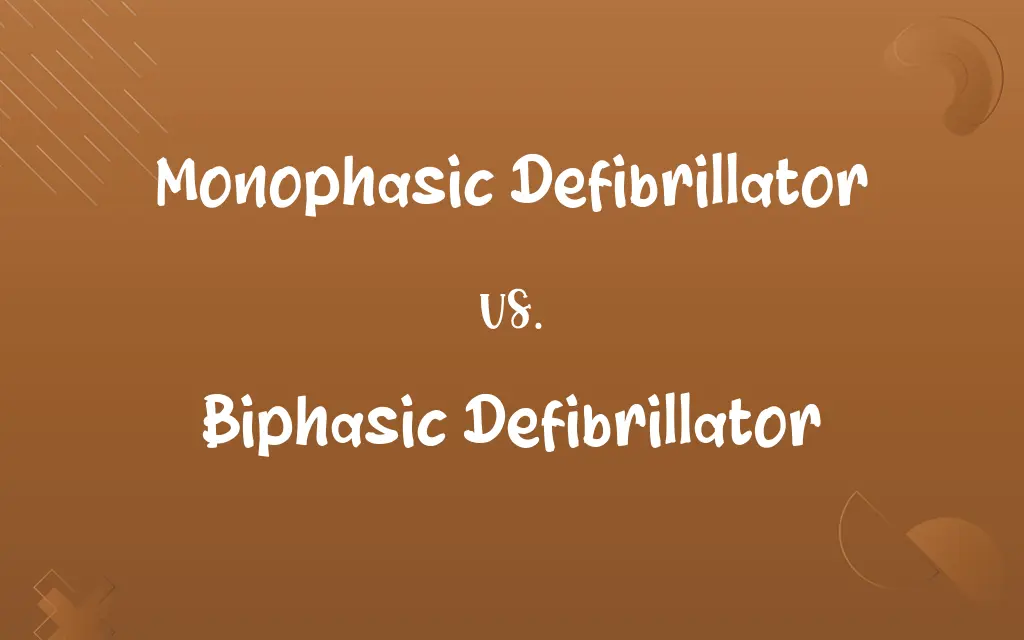Monophasic Defibrillator vs. Biphasic Defibrillator: Know the Difference

By Dua Fatima & Shumaila Saeed || Published on April 6, 2024
A monophasic defibrillator delivers a shock in a single direction, while a biphasic defibrillator delivers shocks in two phases, making it more effective and requiring less energy.

Key Differences
Monophasic defibrillators, an older technology, deliver an electric shock in one direction from one electrode to the other. This singular directional flow was standard in early defibrillation efforts, aiming to reset the heart's electrical activity during arrhythmias. Biphasic defibrillators, a more recent innovation, deliver electricity in two phases—initially in one direction, then in the reverse. This bidirectional approach is more efficient at terminating arrhythmias, allowing for lower energy levels, which reduces the risk of damage to heart tissue.
Shumaila Saeed
Apr 06, 2024
The effectiveness of biphasic defibrillators is higher compared to monophasic ones, with a greater success rate in restoring a normal heart rhythm in cases of cardiac arrest. This efficiency comes from the biphasic waveform's ability to more effectively disrupt the arrhythmic electrical activity of the heart. Moreover, the lower energy requirement reduces the potential for burns and other tissue damage, which was a concern with the higher energy levels used in monophasic defibrillators.
Shumaila Saeed
Apr 06, 2024
In clinical settings, the transition to biphasic defibrillators has been driven by their improved outcomes and safety profile. While monophasic units are still in use, especially in older installations or in certain low-resource settings, the trend has been towards adopting biphasic technology universally. The choice between the two types now largely depends on factors like availability, cost, and the specific clinical setting.
Dua Fatima
Apr 06, 2024
Despite their technological differences, both monophasic and biphasic defibrillators serve the critical function of attempting to save lives during episodes of life-threatening cardiac arrhythmias. Their deployment in emergency medicine, whether in hospitals, ambulances, or public spaces, underscores the importance of defibrillation in cardiac care.
Dua Fatima
Apr 06, 2024
The development and adoption of biphasic defibrillators reflect ongoing advancements in medical technology aimed at improving patient outcomes. As research continues, further innovations in defibrillation techniques and technologies are expected, potentially offering even more effective and safer options for emergency cardiac care.
Hifza Nasir
Apr 06, 2024
ADVERTISEMENT
Comparison Chart
Effectiveness
Lower compared to biphasic
Higher success rate in terminating arrhythmias
Dua Fatima
Apr 06, 2024
Tissue Damage Risk
Higher due to higher energy
Lower, reduces potential for burns and damage
Shumaila Saeed
Apr 06, 2024
ADVERTISEMENT
Clinical Outcomes
Effective in many cases, but with limitations
Improved outcomes and safety profile
Dua Fatima
Apr 06, 2024
Cost and Availability
Generally lower cost, but being phased out
Might be more expensive, but increasingly adopted
Hifza Nasir
Apr 06, 2024
Monophasic Defibrillator and Biphasic Defibrillator Definitions
Monophasic Defibrillator
Lower cost but less preferred.
Due to their lower cost, monophasic defibrillators are still found in some settings.
Shumaila Saeed
Feb 28, 2024
Biphasic Defibrillator
Uses lower energy, reducing tissue damage.
The lower energy requirement of biphasic defibrillators minimizes the risk of burns.
Dua Fatima
Feb 28, 2024
ADVERTISEMENT
Monophasic Defibrillator
Used in early defibrillation technology.
Monophasic defibrillators were groundbreaking in their time for treating cardiac arrest.
Dua Fatima
Feb 28, 2024
Biphasic Defibrillator
Delivers shocks in two phases.
Biphasic defibrillators are favored for their efficiency and safety in cardiac care.
Shumaila Saeed
Feb 28, 2024
Monophasic Defibrillator
Requires higher energy levels.
Monophasic defibrillators use more energy, increasing the risk of cardiac tissue damage.
Shumaila Saeed
Feb 28, 2024
Biphasic Defibrillator
Increasingly becoming the standard.
Hospitals are now transitioning to biphasic defibrillators as the preferred option.
Dua Fatima
Feb 28, 2024
Monophasic Defibrillator
Effective but with limitations.
While effective, monophasic defibrillators are less efficient than newer models.
Dua Fatima
Feb 28, 2024
Biphasic Defibrillator
Reflects advancements in medical technology.
Biphasic defibrillators showcase the latest in emergency cardiac care innovations.
Hifza Nasir
Feb 28, 2024
Monophasic Defibrillator
Delivers shock in one direction.
Older models of defibrillators, like the monophasic, are being replaced due to advancements.
Shumaila Saeed
Feb 28, 2024
Biphasic Defibrillator
Higher effectiveness in arrhythmia termination.
Biphasic technology has a higher success rate in restoring normal heart rhythm.
Dua Fatima
Feb 28, 2024
Repeatedly Asked Queries
Is there a cost difference between the two types of defibrillators?
Biphasic defibrillators might be more expensive due to their advanced technology, but their increased effectiveness and safety can justify the cost.
Hifza Nasir
Apr 06, 2024
What is the main difference between monophasic and biphasic defibrillators?
The main difference lies in the directionality of the shock delivered: monophasic defibrillators deliver it in one direction, while biphasic ones use a two-phase approach.
Shumaila Saeed
Apr 06, 2024
Are biphasic defibrillators safer than monophasic ones?
Yes, due to their lower energy requirements, biphasic defibrillators reduce the risk of damage to heart tissue and other complications.
Dua Fatima
Apr 06, 2024
Why are hospitals switching to biphasic defibrillators?
Hospitals are switching due to the superior safety profile, lower energy requirements, and higher effectiveness of biphasic defibrillators in treating cardiac arrhythmias.
Dua Fatima
Apr 06, 2024
Can both types of defibrillators be used outside of hospital settings?
Yes, both monophasic and biphasic defibrillators are used in various settings, including ambulances and public spaces, although biphasic models are becoming more common.
Hifza Nasir
Apr 06, 2024
What advancements are expected in defibrillator technology?
Ongoing research may lead to even more efficient defibrillation techniques, reduced energy requirements, and minimally invasive approaches, further improving patient outcomes.
Shumaila Saeed
Apr 06, 2024
Why do biphasic defibrillators use less energy?
Biphasic defibrillators are more efficient in disrupting the heart's arrhythmic electrical activity, allowing for successful defibrillation at lower energy levels.
Shumaila Saeed
Apr 06, 2024
Are there any risks associated with using biphasic defibrillators?
While safer and more efficient, improper use or malfunctioning of biphasic defibrillators, like any medical device, can pose risks, emphasizing the need for proper training and maintenance.
Shumaila Saeed
Apr 06, 2024
Can monophasic defibrillators still be effective?
Yes, monophasic defibrillators can be effective in many cases but are generally less efficient and have a higher risk of tissue damage compared to biphasic models.
Dua Fatima
Apr 06, 2024
How do defibrillators reset the heart's electrical activity?
Defibrillators deliver an electric shock to the heart, disrupting the chaotic electrical activity causing the arrhythmia and allowing the heart to potentially restart with a normal rhythm.
Shumaila Saeed
Apr 06, 2024
Share this page
Link for your blog / website
HTML
Link to share via messenger
About Author
Written by
Dua FatimaCo-written by
Shumaila SaeedShumaila Saeed, an expert content creator with 6 years of experience, specializes in distilling complex topics into easily digestible comparisons, shining a light on the nuances that both inform and educate readers with clarity and accuracy.









































































